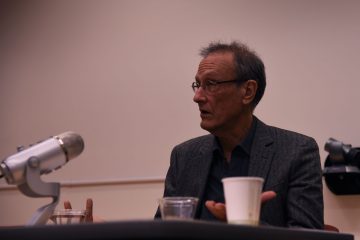Classroom Climate video: Territory Acknowledgement
*
UBC faculty members Drs. Lisa Nathan and Liisa Holsti reflect on introducing territory acknowledgements across their academic units; and Dr. Rima Wilkes discusses her research on territory acknowledgements across 98 Canadian universities.
Territory Acknowledgements in Teaching and Learning at UBC Panel and Webinar
by Amy Perreault and Janey Lew (October 20, 2016)
On October 4th, 2016 CTLT Indigenous Initiatives partnered with the UBC Learning Circle to open up our usual Classroom Climate sessions to a webinar audience. This format provided an interactive space where participants from a variety of communities and locations at UBC and around the country could participate in a dialogue around territory acknowledgments.
Dr. Linc Kesler, Special Advisor to the UBC President on Indigenous Affairs and Director of the First Nations House of Learning opened up the session by acknowledging where we were located, on the ancestral, traditional and unceded lands of the Musqueam peoples. He contextualized his words around the actions taken in addition to speaking the words of an acknowledgement. He said:
“We are acknowledging that a history is here and happened and that there are still people here and that we have a relationship with them. And we are not going to erase that and be silent about that…And that’s a pretty good starting point compared to where we have been.”
Dr. Linc Kesler
Also on the panel was Dr. Daniel Heath Justice, Chair of the First Nations and Indigenous Studies Program. Like Linc, Daniel spoke about the need to take the acknowledgement as a starting point. In his opening comments Daniel also said that acknowledgements should be grounded in ongoing struggles communities are facing. When asked if territory acknowledgements were political Daniel responded, “Absolutely. So is the lack of acknowledgements.”
Later in the session we were joined by Dr. Liisa Holsti and Dr. Rima Wilkes. These faculty members have initiated conversations around territory acknowledgments in their own departments and shared what changes they have seen as a result of doing so. From their reflections we learned that there is continued support for these conversations on campus and that UBC is not the only institution beginning to acknowledge land and build relationships with the Indigenous communities where their institutions are located.
Participants who were joining us via the webinar had several good questions for the panel. Some of these included:
- I’m wondering if Daniel and/or Linc have any suggestions on how a speaker might acknowledge the territory they are on when they might not have any prior knowledge. Where could you find this information if there isn’t someone you can ask?
- Wondering about acknowledgements for distance course work (computer/teleconference ). [D]o we acknowledge where the physical pla[ce] is or the students in the course ?
- Is there a suggested method on how we should do this in our course content and syllabus?
Reflecting on the webinar portion of this event, it became clear that this space and format fosters peer-to-peer sharing of ideas, resources and thoughtful dialogue that complimented the panel discussion. We are grateful for the support and partnership with Divinia Ridley, Program Coordinator at the UBC Learning Circle, and Leah Walker, Associate Director, Education, at the Centre for Excellence in Indigenous Health.
Near the end of the conversation, a member of our audience asked a question about mandatory Indigenous courses at the university. A recent news article was mentioned that addresses some of the complexities of implementing mandatory courses, especially relating to student engagement and student experiences. Read or listen: “Who’s teaching mandated Indigenous content? Students call for more training for professors,” CBC Unreserved with Rosanna Deerchild, October 2, 2016).
Additional Resources
A document developed by UBC Ceremonies and Events in consultation with the Musqueam Protocol Office and the First Nations House of learning
Information on the Musqueam and UBC relationship with a video welcome from Musqueam elder sʔəyəɬəq (Larry Grant) and an explanation by Dr Linc Kesler, Associate Professor of First Nations and Indigenous Studies and Director of the First Nations House of Learning, about why we acknowledge Musqueam territory.
Indigenous Initiatives Territory Acknowledgements Resources PDF
1-page PDF of resources to support further conversations about territory acknowledgements in your classrooms and workplaces. We encourage you to utilize, explore, and share these resources to spark and contribute to conversations about your ongoing responsibilities in relation to the lands where you live, learn, work, and play.
Related Events
Territory Acknowledgements in Teaching and Learning at UBC
October 4, 2016
2:00 pm – 4:00 pm
Irving K Barber Learning Centre, Seminar (Room 2.22 A/B)

